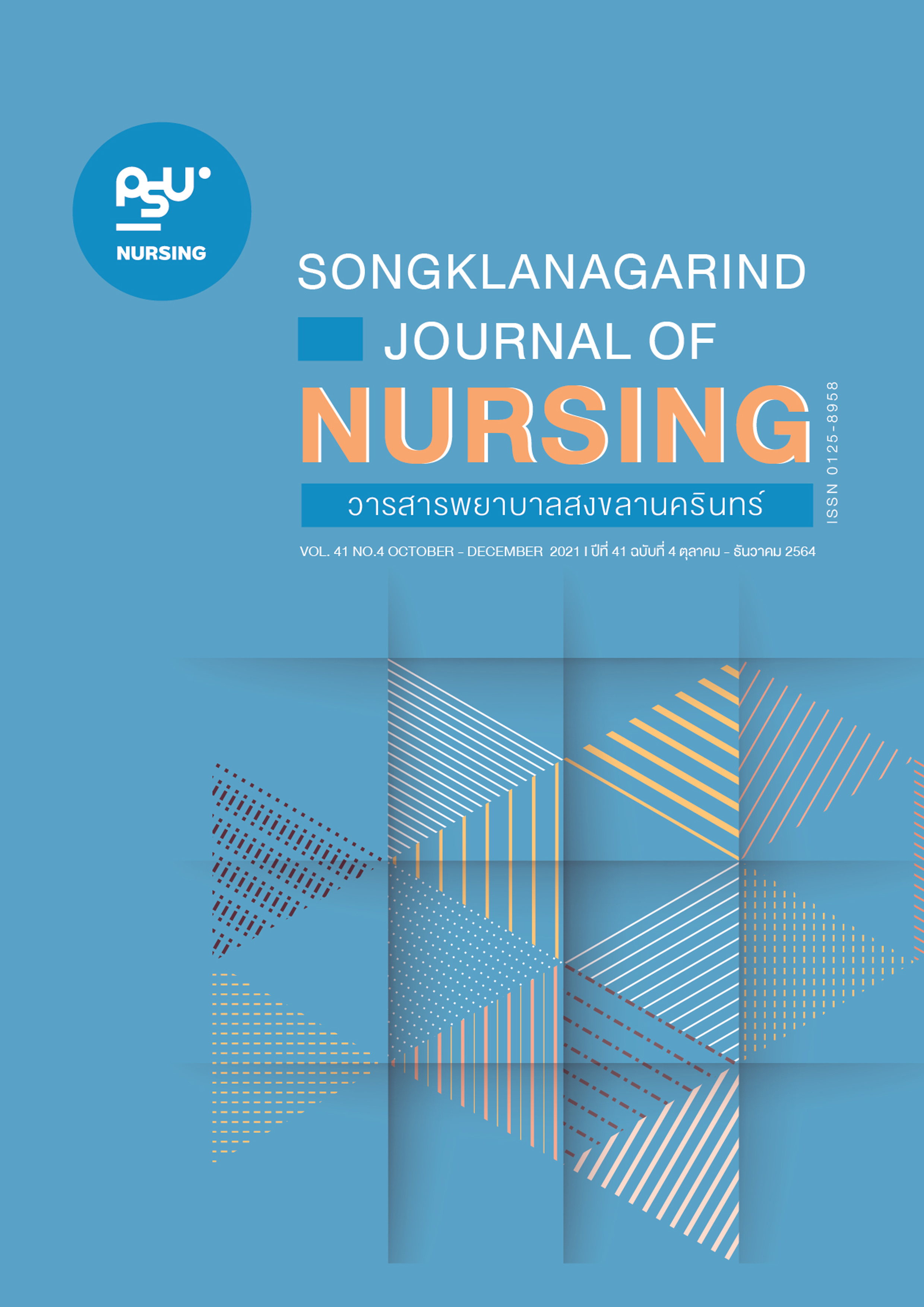Development of Self-management Guidelines for Patients with Type 2 Diabetes in the Semi-urban, Semi-rural Community
Main Article Content
Abstract
Objective: This action research aimed to describe the self-management situation of diabetic patients and develop self-management guidelines for patients with type 2 diabetes in the semi-urban, semi-rural community. Methods: The diabetic patients’ self-management situation was analyzed from the data collected from 57 diabetic patients using a record form and a self-management questionnaire and focus group discussions of nurses and village health volunteers: 4 people in each group. The development of guidelines for self-management support among 15 diabetic patients was operated by applying the 6 steps of selfmanagement of Creer: 1) goal selection, 2) information collection, 3) information processing and evaluation, 4) decision making, 5) action and 6) self- reaction. Results: The majority of diabetic patients aged between 61-70 years (49.10%) and were mostly females (77.20%). The mean of fasting blood sugar (FBS) level was 184.93 mg/dL (SD = 36.20). These diabetic patients had the following complications: diabetic retinopathy
(24.60%), decreased glomerular filtration rate (26.30%) and diabetic foot (12.30%). The guidelines for supporting self-management of diabetic patients, nurses had a meeting with the patients to set goals on physical activities, diet, stress reduction and promotion of knowledge. The caregivers were the supporters of the activities and gave the patients reinforcement. The Village Health Volunteers (VHVs) monitored and supported the activities at home and reinforced the patients. It was also found that the mean of all selfmanagement behaviors after participating in this process (M = 3.63, SD =.21) was significantly higher than before participating in the process (M=2.88, SD=.26) at the level of 0.05, and FBS after participating in the process (M = 169.67 mg/dL, SD=29.45) was significantly lower than before participating in the process (M = 184.93, SD=36.20) at the level of 0.05. Conclusion: Self-management on food should be developed for patients with type 2 diabetes.
Article Details

This work is licensed under a Creative Commons Attribution-NonCommercial-NoDerivatives 4.0 International License.
References
International Diabetes Federation [IDF]. IDF Diabetes Atlas. 8 th ed [Internet]. n.p; 2017 [cited 2020 Aug 9]. Available from: https://diabetesatlas.org/upload/resources/previous/files/8/IDF_DA_8e-EN-final.pdf
Bureau of Non-Communicable Diseases, Department of Disease Control, Ministry of Public Health. 2017. 5-Year National NCD Prevention and Control Strategic Plan (2017-2021). 1 st ed. Nonthaburi: Emotion Art Co., Ltd; 2017. Thai.
Absuwan N, Phanthuvej N. Campaign Issues Diabetes Day [Internet]. n.p; 2014 [cited 2020 Sep 21]. Available from: http://www.thaincd.com/document/file/download/leaflet/
Kanchanaphibulwong A, Khamwangsanga P, Kaewtha S. Report on the situation of diabetes, high blood pressure and related risk factors NCDs 2019. Nonthaburi: Graphic and Design Publishing House; 2019. Thai.
Ban Pet Health Promoting Hospital. Annual 2019; 2019. Thai.
Methanopphakhun T. Prevalence and factors associated with Diabetic Retinopathy in Hua Hin Hospital, Prachuap Khiri Khan province. 2020; 39(2): 178-88. Thai.
Ontha R, Moolsart S, Pitchayapinyo P. The development of a home visit model based on Participation between professional nurses and village health volunteers for type II Diabetes. Journal of Nursing and Health Care. 2016; 34(3): 19-27. Thai.
Sanee A. Self Management Program in Chronic Diseases. Journal of The Royal Thai Army Nurses. 2014; 15(2): 129-34. Thai.
Tun NN, Arunagirinathan G, Munshi SK, Pappachan JM. Diabetes mellitus and stroke: A clinical update. World J Diabetes. 2017; 8(6): 235-48. doi: 10.4239/wjd.v8.i6.235.
Wagner EH, Austin BT, Davis C, et al. Improving chronic illness care: Translating Evidence Into Action.
Health Aff. 2001; 20(6): 64-78. doi: 10.1377/hlthaff.20.6.64.
Barr VJ, Robinson S, Marin-Link B, et al. The expanded Chronic Care Model: An Integration of concepts and strategies from population health promotion and the Chronic Care Model. Hosp Q. 2003; 7(1): 73-82.
doi: 10.12927/hcq.2003.16763.
World Health Organization [WHO]. Innovative Care for Chronic Condition: Building Blocks for Action. Geneva: Switzerland; 2002.
Lorig KR, Holman HR. Self-management education: History, definition, outcomes, and mechanisms. The Society of Behavioral Medicine. 2003; 26(1): 1-7. doi: 10.1207/S15324796ABM2601_01
Naylor MD, Brooten DA, Campbell RL, et al. Transitional care of older adults hospitalized with heart failure: A randomized, controlled trial. J Am Geriatr Soc. 2004; 52: 675-84. doi: 10.1111/j.1532-5415.2004.52202.x.
Ryan P, Sawin KJ. The individual and family selfmanagement theory: background and perspectives on
context, process, and outcomes. Nurs Outlook. 2009; 57(4): 217-25. doi: 10.1016/j.outlook. 2008.10.004.
Creer TL. Self-management of chronic illness. In: Boekarts M, Pintrich P, Seidner M, editors. Self-regulation: theory, research, and applications. Orlando, FL: Academic Press; 2000. doi: 10.1016/B978-012109890-2/50047-0.
Ratanapitak U, Krainuwat K, Sriwijitkamol A, et al. The Effects of a Diabetic Self-management Program on Knowledge, Behavior, and Health Indexes among People with Type 2 Diabetes. J Nurs Sci. 2013; 31(1): 7-18. Thai.
Peeraphruetthipong N, Pakdevong N, Namvongprom A. Journal of Nursing Association of Thailand NortheasternDivision. 2012; 30(2): 98-104. Thai.
Junchai J, Therawiwat M, Imame N. Diabetes education and Self-management program of persons with Type 2 Diabetes, Prachuap Khiri Khan province. The Public Health Journal of Burapha University. 2012; 7(2): 69-83. Thai.
Kemmis S, McTaggart R. Participatory Action Research: Communicative Action and the Public Sphere. In: Denzin NK, Lincoln YS, Editors, The Sage handbook of qualitative research: Sage Publications Ltd; 2005. p. 559-603.
Duangklad K, Lapvongwatana P, Chansatitporn N. Improvement of Self-Management program in uncontrolled Type II Diabetes patients. Journal of Health and Nursing Research. 2020; 36(10): 66-83. Thai.
Likhiyluecha N, Atthachaiwat A, Wongsuvansir S, et al. Development of Care Management Model for Patients with Uncontrolled Diabetes. Journal of the Division of Nursing. 2017; 44(2): 141-58. Thai.
Sattayasomboon T, Sattayasomboon S. Hypertension and type 2 Diabetes Mellitus Patients: A Systematic Review on the Chronic Care Model (CCM) and Self-Management Support (SMS). The Southern College Network Journal of Nursing and Public Heath. 2020; 7(2): 232-43. Thai.
Phinyo K, Phinyo P, Aphiphatkan W, et al. Effects of the North Eastern (Esan) Thai Folk Dance Exercise Program on Physical Fitness and Blood Sugar Levels in Patients with Type 2 Diabetes Mellitus. Songklanagarind Journal of Nursing. 2020; 40(3): 1-14. Thai.
Kongsakul S. Effects of Self-Management Skills Training Program on Self-Management Behavior Self-management to control diabetes and blood sugar levels in people with type 2 diabetes. [master’s minor thesis]. [Bangkok]: Faculty of Nursing Thammasat University; 2013. 165 p.


